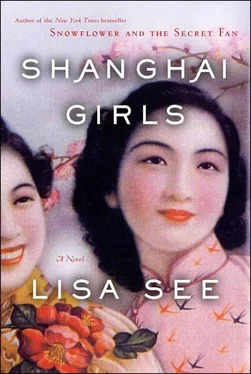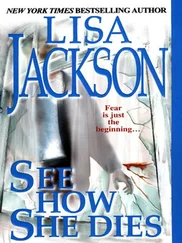Once Mama’s feet are washed and wrapped in clean bindings, the woman sets to making dinner. We give her some of our rice, which she pours into a pot of boiling water, and she begins the constant stirring that will turn the two ingredients into jook .
For the first time, I allow myself to look around. The place is filthy and I dread eating or drinking anything in this room. The woman seems to sense this. She puts empty bowls and tin soupspoons on the table along with a pot of hot water. She gestures to us.
“What does she want us to do?” May asks.
Mama and I don’t know, but our wheelbarrow pusher picks up the pot, pours it into the bowls, dips our spoons in the hot water, swirls the liquid, and then tosses the water on the hard-packed earthen floor, where it’s absorbed. The woman then serves us the jook , onto which she floats some stir-fried carrot greens. The greens are bitter in the mouth and sour on swallowing. The woman steps away and returns a moment later with some dried fish, which she drops into May’s bowl. Then she stands behind May and kneads her shoulders.
I have a flash of irritation. This woman-poor, obviously uneducated, and a total stranger-gave the wheelbarrow pusher the largest bowl of jook , provided Mama with privacy, and now frets over May. What is it about me that even strangers recognize as not being worthy?
After dinner, our pusher goes outside to sleep by his wheelbarrow, while we stretch out on straw mats laid on the floor. I’m exhausted, but Mama seems to burn with a deep fire. The petulance that’s always been so much a part of her character disappears as she talks about her own childhood and the house where she was raised.
“In the summer when I was a girl, my mama, aunties, my sisters, and all my girl cousins used to sleep outside on mats just like this,” Mama remembers, speaking low so as not to disturb our hostess, who rests on a raised platform by the stove. “You’ve never met my sisters, but we were a lot like the two of you.” She laughs ruefully. “We loved each other and we knew how to argue. But on those summer nights when we were out under the sky we didn’t fight. We listened to my mother tell us stories.”
Outside cicadas hum. From the far distance comes the concussion of bombs being dropped on our home city. The explosions reverberate through the ground and into our bodies. When May whimpers, Mama says, “I guess you’re not too old to hear one now…”
“Oh, yes, Mama, please,” May urges. “Tell us the one about the moon sisters.”
Mama reaches over and pats May lovingly. “In ancient days,” she begins in a voice that transports me back to my childhood, “two sisters lived on the moon. They were wonderful girls.” I wait, knowing exactly what she’ll say next. “They were beautiful like May-slender as bamboo, graceful as willow branches swaying in the breeze, with faces like the oval seeds of a melon. And they were clever and industrious like Pearl -embroidering their lily shoes with ten thousand stitches. All night the sisters embroidered, using their seventy embroidery needles. Their fame grew, and soon people on earth gathered to stare at them.”
I know by heart the fate that awaits the two mythical sisters, but I feel Mama wants us to hear the story differently tonight.
“The two sisters knew the rules for maidenly conduct,” she goes on. “No man should see them. No man should stare at them. Each night, they became more and more unhappy. The older sister had an idea. We shall change places with our brother.’ The younger sister wasn’t so sure, for she had a tiny bit of vanity in her, but it was her duty to follow her jie jie’s instructions. The sisters put on their most beautiful red gowns embroidered with dragons dashing through fiery blooms and went to visit their brother, who lived in the sun. They asked to trade places with him.”
May, who’s always liked this part, picks up the story. “‘More people walk the earth by day than by night,’ their brother scoffed. ‘You will have more eyes on you than ever before.’”
“The sisters wept, much like you used to, May, when you wanted something from your father,” Mama continues.
Here I am, lying on a dirt floor in some hovel, listening to my mother trying to comfort us with childhood stories, and my heart wrinkles with bitter thoughts. How can Mama talk about Baba so easily? As bad as he is-was?-shouldn’t she be grieving? And, worse, how can she choose this time to remind me that I’m less precious to him? Even when I cried, Baba never gave in to my tears. I shake my head, trying to expel the unkind thoughts I have about my father when I should be worrying about him, and telling myself that I’m too tired and scared to be thinking properly. But it hurts, even in this moment of hardship, to know I’m not as loved as my sister.
“The brother adored his sisters and finally agreed to change places with them,” Mama says. “The sisters packed up their embroidery needles and went to their new home. Down on earth, the people looked up and saw a man in the moon. ‘Where are the sisters?’ they asked. ‘Where have they gone?’ Now when anyone looks at the sun, the sisters use their seventy embroidery needles to stab at those who dare to stare too long. Those who refuse to turn away go blind.”
May lets her breath out slowly. I know her so well. In moments she’ll be asleep. From the platform in the corner, our hostess grunts. Did she not like the story either? I ache all over, and now my heart aches too. I close my eyes to keep the tears from falling.
Soaring Through the Night Sky
THE NEXT MORNING, the woman boils water so we can wash our faces and hands. She makes tea and gives us each another bowl of jook . She smears more of her country medicine on our feet. She gives us old but clean footbinding cloths to use as bandages. Then she follows us outside and helps my mother back into the wheelbarrow. Mama tries to pay her, but she waves it away, refusing even to look at us again she’s so insulted.
All that morning we walk. Mist hovers above the fields. The smell of rice cooking over straw fires wafts to us from the villages we pass. May’s green hat and my hat with the feathers-both saved during Old Man Louie’s rampage-were carefully packed, so as the day wears on our skin parches and burns. Eventually May and I join Mama in the wheelbarrow. Our pusher never complains, never threatens to abandon us, never asks for more money. He stoically just keeps putting one foot in front of the other.
In the late afternoon, just as the day before, he turns down a pathway toward a farm that seems even poorer than the last one. The wife sorts seeds with a sleeping baby tied to her back. A couple of sickly children do other chores with extreme lassitude. The husband looks us over, calculating how much he should charge. When his eyes find my mother’s feet, he grins toothlessly. We pay more than we should for some dry patties made from ground corn.
Mama and May fall asleep before I do. I stare at the ceiling. I listen to a rat skitter along the walls of the room, stopping to gnaw on this and that. My whole life I was spoiled with what I ate, what I wore, where I slept, how I moved from one place to another. Now I think how easy it would be for May, my mother, me, and people like us-privileged and cared for-to die out here on the road. We don’t know what it means to get by on almost nothing. We don’t know what it takes to survive day to day. But the family that lives here and the woman who took us in last night do. When you don’t have much, having less isn’t so bad.
The next morning we walk around a village that’s been burned to the ground. On the road we see those who tried unsuccessfully to escape: men bayoneted and shot, babies abandoned, and women, wearing only tunics, with the bottom halves of their bodies exposed and their bloody legs splayed at odd angles. Just after noon, we pass dead Chinese soldiers moldering in the hot sun. One is curled into a ball. The back of his hand rests in his mouth as if in his last moments he was biting back pain.
Читать дальше












